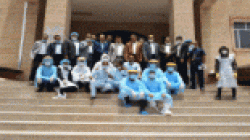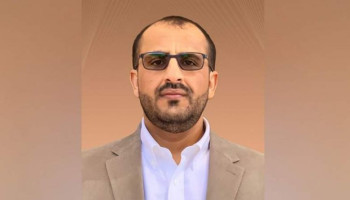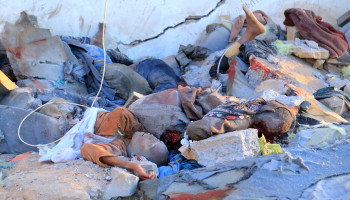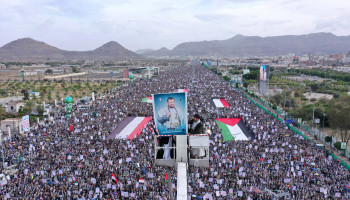Republican Hospital Authority In Hajjah … A quantum Leap In Medical Services Despite The Aggression
السبت, 01 أغسطس 2020

The Republican Hospital Authority in Hajjah province saw a qualitative step in expanding of medical services as new wards, departments and centers have been opened, including the development of diagnostic services despite the repercussions of the aggression and the blockade imposed on Yemen and its people.
Since the beginning of last year, the Authority's projects and achievements have focused on meeting the growing needs of more than 2.5 million people as part of a strategic plan that has led to the upgrading of medical services and the introduction of new services that have not been available since before the aggression.
Despite the scarcity of resources and the increasing needs of working in hospital departments and centers, the Authority has achieved a quantum leap in medical, health, and treatment services during the past year and the first half of this year.
New projects and Departments:
As part of its 2019 plan, the Authority has completed projects such as the construction of the obstetric and diagnostic emergency centers, the rehabilitation of the major surgical and intensive care department, the opening of the oxygen manufacturing unit and the drinking water desalination plant to provide water needs for the hospital's departments.
It also adopted a section of the General Emergency Center to receive medical conditions and increase clinical capacity in the departments of general emergency, obstetrics, intensive care, preterm birth, operations, and surgery, as well as to double the technical staff of shifts in the departments of operations, intensive care, radiology, laboratories, and other wards in order to ensure their continuation of its work in 24-hour.
During the first half of this year, the hospital's internal laboratory was upgraded and equipped with modern medical equipment, repairing the floor of the operations department, establishing the department of biology/microscope department, and providing it with equipment, as well as repairing and rehabilitating the operating room in the obstetric emergency department.
The electricity network has also been rehabilitated and expanded for the emergency building, the expansion of the ground reservoir of the dialysis center was rehabilitated and expanded, the restoration and rehabilitation of the sterilization department, and the rehabilitation of the roof of the emergency obstetric building too.
Visitors increasing and increasing clinical capacity:
According to hospital statistics, clinical capacity increased by 45 percent during the last period to keep pace with the increase of hospital visitors as the number of beneficiaries reached 364 thousand cases during the first half of this year.
The Authority's report indicated that the number of beneficiaries of out-patient services reached 82 thousand and 591 cases and from the services of the emergency obstetric center 124 thousand and 588 cases, while 22 thousand and 260 cases benefited from services of the general emergency department.
It noted that the number of beneficiaries of diagnostic radiology services reached 29 thousand, 88 cases, and 7 thousand and 11 cases of Bedding Department as well as four thousand and 401 cases of the blood bank.
According to the report, 2,378 surgeries were performed at the hospital, 28,976 laboratories were conducted, while the Intermediate Nutrition Unit and the internal and external severe acute malnutrition departments served 3,255 cases.
The Authority said the Dialysis Center provided kidney dialysis services to 1,458 patients in weekly sessions as free of charge, while 6,988 cases of ECG, Audiometry units, vision measurement, and rabies were provided as well.
The Authority's report pointed out that the number of cases that benefited from free pharmaceutical services was 14 thousand and 569 cases, and 36 thousand and 489 cases of emergency department services.
Translating ambitions:
Authority Chairman Dr. Abdul-Malik Jahaf explained that the clinical capacity has been increased from 148 beds to 350 beds as opening new departments and centers and adding services that were not present.
He pointed out that the challenges faced the Authority during the past five years were the difficulty of obtaining specialized staff, as well as the repercussions of the blockade and its implications for the provision of medicines for chronic diseases, spare parts for medical devices, and fuel interruptions from time to time.
"The Authority has previously faced a problem in preparing a systematic plan for the development of staff and evaluating the assets and properties of the Authority," he said.
Jahaf pointed out that some of the problems were addressed through the implementation of the project of inventory and evaluation of property and assets, which amounted to three billion, 340 million and 810 thousand riyals distributed on land, buildings, construction, machinery, equipment, cars, transportation and others.
With regard to the modernization of the devices, the Chairman of the Authority indicated that 75 percent of the modernization plan had been completed and 25 devices had been restored, as well as the establishment of a workshop for the maintenance of various medical devices in the hospital departments and centers.
With regard to the expansion projects, he said that incubators had been doubled from six to 25 incubators, two intensive care clinics were provided and supplied in the department of preterm infants and a number of beds for the department of obstetrics and gynecology and specialists were provided to work in the department.
Dr. Jahaf explained that the expansion of services included the opening of a department for diagnosis and early detection of cervical tumors, a CT center, a department for medical farms, for the first time in the hospital, and the province in general, indicating that the Authority is in the process of opening the cancer oncology unit.
He emphasized that one of the authority's recent medical achievements is carrying out successful surgeries for a number of patients in the brain, nerves, spine, and eyes.
Dr. Jahaf stated that the Dialysis Center provides hemodialysis sessions for more than 247 patients, up from eight cases in 2015, noting that the center offers free hemodialysis sessions at the rate of 771 sessions per week, appreciating what is being provided to support the continuation of the center's services from philanthropists or the ICRC's contributions to the provision of hemodialysis supplies.
Limited support:
Dr. Jahaf pointed to WHO's cooperation in supporting some activities and providing some needs, MSF's cooperation in facilitating services for certain departments, and UNICEF's support for maternity and childhood services since 2019.
He stressed that the support received by the Authority had been very limited and did not live up to the need. Dr. Jahaf expressed the hope that humanitarian organizations would contribute to support the Authority and what it aspires to achieve in the field of maternity, childhood, gynecology, and other specialized services in neurosurgery and urology.
Dr. Jahaf pointed out that the Authority was able to implement the projects of the first phase of the national vision by raising the level of staff performance, strengthening the automation of the health system and infrastructure projects, providing and maintaining equipment, adding services to laboratory and emergency departments, a Care Unit and the development of treatment centers.
Isolation Hospital:
On the Authority's role in completing the project at the Hospital Health Isolation in Hajjah city, Dr. Jahaf explained that the Authority adopted in coordination with the leadership of the Ministry of Health and the province the establishment of the hospital and the provision of its requirements and its equipment until it was opened by the Minister of Health and the province's governor.
He pointed out that the Authority's leadership is seeking to find specialized centers to relieve the pressure on the hospital with the implementation of the medical complex project, which is one of the tributaries of the health sector in the province to provide medical services for accidents and emergencies.
Dr. Jahaf pointed out that this project is the result of the efforts of the governor by providing a building of the government complex and allocating it to the medical complex.
He expressed appreciation for the role of the Minister of Health in encouraging the completion of preparing the complex, explaining that the first phase of rehabilitation and equipping of the building is being implemented as an emergency and accident center.
Dr. Jahaf pointed out that the maternity and childhood center is being developed in at the hospital, and it will be developed a hospital for infectious diseases, isolation, 'contagious like Cholera, dengue fever', and other centers, pointing out that the clinical capacity of the Republican authority hospital will be increased by the end of this year to more than 420 beds.
He said that the authority's plan for the current year included in six months the implementation of 12 training courses for more than 70 cadres inside the Authority and the training of other cadres in the Capital Sanaa in the field of Respiratory Care.
The Authority's Chairman emphasized continuing to implement the aspirations to establish specialized centers in order to treat tumors, children's emergencies, the heart, and the eyes, praising the efforts of the medical, nursing, technical and administrative staff working in the Authority and their concerns to alleviate the suffering of patients.
Source: Websites
Y.A






